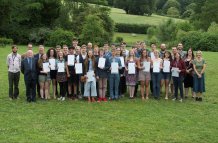
As well as A-levels, students study for the Exeter Mathematics Certificate.
Dedicated mathematicians honoured for work to calculate how to score goals and predict rainfall
Enthusiastic teenage mathematicians in the South West have used their talents to try to work out how to take the perfect free kick in football, predict rainfall or make Britain float.
Students at the Exeter Mathematics School have joined forces with academics from the University of Exeter to carry out work normally undertaken by undergraduate students. They also worked with organisations such as Apple and the Met Office, using their skills to solve problems.
The Exeter Mathematics School is one of England’s first mathematics free schools and is already among the top performing state schools in the country. It is one of only two sixth forms to specialise in Mathematics and Physics, and is sponsored by the University of Exeter and Exeter College.
The sixth form offers young people in the South West who show potential to do well in STEM subjects the chance to study an exciting and challenging curriculum, and work with leading academics at the University of Exeter. Last year half of all pupils went to Russell Group universities and 15 per cent to the University of Oxford.
As well as A-levels, students study for the Exeter Mathematics Certificate; a separate qualification designed to prepare pupils for independent study and the world of work. To get the certificate students have to complete a rigorous academic programme devised by University of Exeter academics in consultation with Exeter Mathematics School staff. Students work regularly with academics to research a question or problem posed by lecturers and professors and present their answer to hundreds of people at lectures hosted by the University of Exeter. They then progress to complete a piece of individual research of their own choosing.
Pupils who completed the certificate this year also researched how to make a meteorite detector, how to predict rainfall and if the Island of Britain could ever become seaworthy by floating to a different part of Earth. Other projects included the mathematics of badminton, earthquakes and file sharing. They celebrated their completion of the certificate at an event at the University of Exeter this week.
Exeter Mathematics School headteacher Kerry Burnham said: “The certificate has really pushed the students to work outside their comfort zone, to do things that weren’t sure if they could.
Having completed it they are now more prepared for University and the world of work. They have overcome significant challenges and demonstrated perseverance to complete the certificate.”
Professor Tim Quine, University of Exeter Deputy Vice-Chancellor (Education), said: “It is a real joy to celebrate the success of these students. The Exeter Mathematics School only opened three years ago but it is already providing a real breadth of opportunities for pupils in the South West and is among the best schools in the country.
“We have all worked together: teachers, academics and lecturers at Exeter College, and we know from a recent visit by the Secretary of State for Education ,Justine Greening MP, that the Government has really taken on board what you can achieve through this type of collaboration.”
To complete his Exeter Mathematics Certificate George Cooper, 18, from Holsworthy, researched how maths can help show how to take the perfect free football kick. George, who hopes to study maths at the University of Bath, used equations about motion, using the Brazilian footballer Roberto Carlos for his project.
“I have found you need to kick the ball into the top corner towards the edge of the goal,” he said.
Lena Steinberg, 18, researched how a river meanders, focusing on the River Exe, for her project. She hopes to study engineering at the University of Sheffield.
“I’ve really enjoyed working in the informal atmosphere at the school,” she said.
Emily Keenan, 18, from Sidmouth, wants to study physics at the University of Manchester. Her research was on particle acceleration.
“Having to present our research to so many people was character-building but a great experience,” she said. “We have been supported so much by our teachers, who are amazing.”
Date: 7 August 2017
